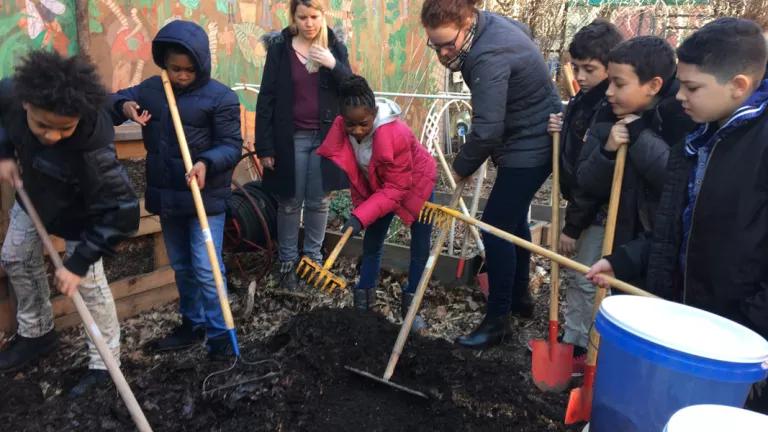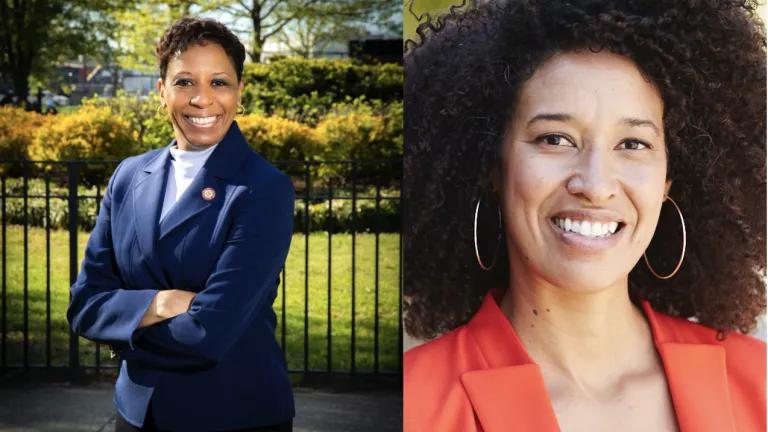NYC Must Enact a Universal Food Waste Composting Law
One of the top environmental challenges for Mayor Eric Adams and the City Council is to establish a sensible program for collecting and sustainably disposing of household organics—food scraps, yard waste, and food soiled paper.

NYC’s current system for collecting food waste – placing it on the curb in plastic bags – is exacerbating the city’s rat problem.
One of the top environmental challenges for the new administration of Mayor Eric Adams and a mostly new City Council led by Speaker Adrienne Adams is to establish a sensible program for collecting and sustainably disposing of household organics – food scraps, yard waste and food soiled paper. These materials make up fully one third of the trash New Yorkers generate, roughly 4,000 tons of putrescible waste every day.
The current system for disposing of New York City’s organic waste is problem-plagued, environmentally unsound and costly to city taxpayers.
The overwhelming majority of the city’s discarded food scraps and yard waste is sent to landfills or incinerators. But when buried at landfills, these organic materials breakdown and release methane, a very potent global warming gas. (Landfills are the third largest source of methane emissions in the nation, according to the U.S. Environmental Protection Agency.) And at incinerators, the high moisture content of food scraps and yard waste upsets the burning process, leading to increased localized emissions of air contaminants.
Making matters worse, these landfills and incinerators are too often located in lower income neighborhoods outside of New York City and contribute disproportionate environmental burdens in those communities. (For example, about 1,000 tons a day of Manhattan’s waste, including organics, have for years been sent to the troubled Covanta incinerator in Newark, New Jersey.)
There’s another problem associated with the current system of combining food waste with other trash that New Yorkers place out at curbside for Sanitation Department collection: the black bags containing these putrescible mixed wastes provide easy food access for the city’s increasingly brazen rat population.
In contrast, composting organic waste offers numerous advantages. It is a natural process that advances the decomposition of food scraps, yard waste and food-soiled paper and results in finished compost, which is rich in nutrients and resembles fertile garden soil. Finished compost is used as a soil supplement that reduces the need for chemical fertilizers, prevents erosion, helps retain moisture and aids in the growth of crops, street trees and houseplants.
And composting operations create twice as many jobs as do landfill facilities (and four times more than incinerators) per ton of trash disposed of.
Well-designed compost collection programs also assist homeowners in placing their organics at curbside in resealable, vermin- and animal-proof containers, rather than black plastic bags. This reform alone would remove an easily accessible source of free food for millions of New York City rats.
Another option, which is also preferable to landfilling or incineration, is to send the collected food scraps and yard waste to anaerobic digesters. Like composting, anaerobic digestion is a natural process that uses bacteria to break down organic matter. But unlike composting, anaerobic digestion takes place in a sealed tank; the breakdown of organics in this setting produces “biogas,” primarily methane, which can be captured and used to replace fossil-fuel generated natural gas. This makes most sense at farms and sewage treatment plants (some of which already have digesters to handle their existing waste loads, as well as the potential to use captured methane on-site to power their operations).
Officials have long known that organic waste can and should be handled more sustainably than is current practice in New York City today.
- As far back as 2013, then-Mayor Michael Bloomberg called food waste "New York City's final recycling frontier." He noted that turning food waste into compost or energy could save taxpayer dollars (vs. landfilling and incineration) and sought to facilitate citywide food waste collections.
- In 2014, then-Mayor Bill de Blasio and his newly appointed Sanitation Commissioner, Kathryn Garcia, proposed to rollout composting collections across the city over the next five years. In 2015, de Blasio’s first sustainability plan included, as its #1 solid waste objective, the goal of expanding the city’s fledging compost collection program “to serve all New Yorkers by the end of 2018.”
- The New York City Council first enacted legislation to jumpstart food waste composting collections for both residents and businesses almost a decade ago. And in 2020, then-Speaker Corey Johnson released a comprehensive City Council plan to combat climate change. That plan recognized that a "key strategy" for the city was to "mandate citywide curbside organics separation and collection."
Despite these commitments, city policy has sailed in the opposite direction. The Sanitation Department’s voluntary, residential curbside compost collection program, which began in 2013, was abruptly terminated by City Hall in the Covid-related budget cuts of 2020. It returned in a somewhat revamped form this past summer. But it’s voluntary nature, combined with other challenges, has resulted in a program that has limited public participation, is collecting only a tiny fraction of potentially available organics and remains costly to operate.
Meanwhile, the city’s vibrant community-based food waste drop-off sites – which then-Mayor de Blasio’s budget team also proposed to defund in 2020 – has managed to hang on only as a result of an emergency City Council appropriation that year and the determination of dedicated neighborhood non-profit groups that run the operations. Today, the Sanitation Department is supporting about 200 of these voluntary food drop-off sites, many of them at GrowNYC’s Greenmarkets.
But at the same time, the Parks Department has sought to evict two of the most successful and most beloved community composting non-profits, the Lower East Side Ecology Center and Big Reuse, from their operations on Parks’ properties. Under the former mayor, Department chieftains inexplicably insisted that neighborhood-based composting activities don’t belong in city parks. They did so even as the Department continued to ship large amounts of compostable leaves and yard waste that were generated in the parks themselves to methane-generating landfills.

The sustainable and jobs-producing solution to dealing with NYC’s food waste is to compost it – a strategy that non-profits like Brooklyn-based Big Reuse have proven can succeed.
Around the world, across the nation and right here in New York City, the impacts of extreme weather are already being felt. The climate crisis is upon us. And it warrants a rapid, multi-pronged counterattack.
If New York City wants to be a national leader in the environmental fight of the century, it must place adoption of a mandatory curbside composting collection program for all residents high up on its To-Do list for 2022.
In Part II of this blog, we will outline specific provisions that should be incorporated into a New York City universal food waste collection and composting statute.




